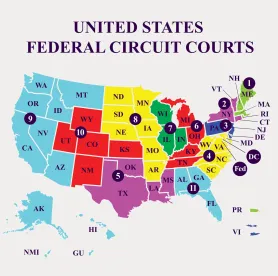In Olson v. United States, 2021 WL 137911 (Fed. Cl. 2021), lessees of trust land on the Yakama Reservation, sued the United States in the Court of Federal Claims under the Tucker Act, contending that the Wapato Irrigation Project (WIP), which provided irrigation water to customers within the reservation, had violated its implicit agreement to provide water for their crops. The Court dismissed on the grounds that the United States, though acting as trustee for the trust beneficiaries, was not a party to the leases: “Each of these documents states that the lease or permit is a contract entered into ‘by and between the Indian or Indians named below (the Secretary of the Interior acting for and on behalf of the Indians) hereinafter called the ‘landlord,’' and an individual tenant. … Long-standing precedent from the Supreme Court, along with more recent binding precedent from the Federal Circuit, makes clear that the exercise of such agency does not place plaintiffs in privity with defendant. … [I]n order to establish privity with defendant, plaintiff must demonstrate that the United States took some action indicating its intent to assume contractual obligations… There is simply nothing in the contracts at issue, and plaintiffs alleged no facts surrounding the execution or performance of the contracts, that indicates such an intent. After careful review of the contracts, the court has found no provision that speaks to any intent to assume the obligation to deliver irrigation water—on the part of defendant or any other entity.”
In United States v. Hump, 2021 WL 274436 (D.S.D. 2021), the Humps, a married couple, borrowed money from a local bank for the purchase of trust land within the Cheyenne River Sioux Tribe, as well as to finance purchase of livestock and equipment. The loan was guaranteed by the Department of the Interior under its Indian Loan Guaranty Program. When the Humps defaulted, the government sued in federal court to foreclose on the trust land. The Court granted the government summary judgment, rejecting the Humps’ arguments that the government was required to exhaust tribal court remedies: “[T]he United States is commencing a foreclosure action on tribal trust land situated in the District of South Dakota. As such, this Court has jurisdiction to hear the case under 28 U.S.C, § 1345. Moreover, the United States was not required to exhaust its remedies in tribal court because tribal self-government and self-determination are not implicated in this matter. Rather, this is a dispute between the United States and individuals who have defaulted on a loan guaranteed by the federal government under a federal program. The Cheyenne River Sioux Tribe is not involved in this action in any capacity. In sum, this Court has jurisdiction over this case.”
In Grondal v. Mill Bay Members Association, Inc., 2021 WL 183408 (E.D. Wash. 2020), Evans, the owner of a 5.4% interest in a trust allotment known as MA-8 near the Colville Reservation, obtained the consent of a majority of the other allottee interest holders to a lease of MA-8 for 25 years, with an option to renew for an additional 25 years, for purposes of operating a campground. BIA approved the lease in 1984. The following year, Evans sent BIA a letter purporting to renew the lease but, contrary to the terms of the lease, failed to notify the other owners by certified mail. Evans developed an RV park on the leasehold and sold memberships providing for rights of use and occupancy to certain lots through 2034. BIA approved a modification to the lease describing members’ expanded rights. In 1993, Evans subleased a portion of the leasehold to Colville Tribal Enterprise Corporation (CTEC), an instrumentality of the Confederated Tribes of the Colville Reservation, for a casino (Casino Sublease). In 1994, a second sublease was entered between Evans and the CTEC when the casino opened. Upon Evans’ death in 2003, Wapato Heritage LLC acquired Evans’ interest. Under the terms of the Master Lease, Evans, as Lessee, was required to perform and provide an audit and provide the results to the individual allottees, as Lessors, in addition to the Secretary of the BIA. In 2007, the BIA determined that the action Evans had taken in 1984 to trigger the renewal option was invalid and that the lease would expire in 2009, a determination later upheld by the federal court. In March 2009, the BIA and the Colville Tribes entered into a lease for MA-8 (Colville Lease). Campground members sued Wapato and tribal and federal officials. Wapato cross-claimed against BIA and tribal officials, claiming it was neither given notice nor an opportunity to vote on the grant of that lease and that the Colville Tribes had operated its casino on MA-8 continuously without the payment of rent to Wapato Heritage since Feb. 9, 2009. Wapato claimed that Evans had overpaid under the BIA and, by extension, the allottees by $751,285 and that CTEC had underpaid Evans by $886,248. The District Court had previously held that the Master Lease expired as of Feb. 2009, that the BIA was not a party to the lease and that BIA had not breached a fiduciary duty by failing to review a proposal by Wapato Heritage for a 99-year replacement lease. In the instant case, the court dismissed Wapato’s remaining claims against the federal officials: “Here, the Lessee of the 2009 Replacement Lease was the Colville Tribal Federal Corporation, who is not a party in this matter. Wapato Heritage misdirects the purported failure to notify Wapato Heritage about the lease at the Colville Tribes. Even if the lessee had notified Wapato Heritage, there is no basis to void the 2009 Replacement Lease where (1) 50 percent of the owners consented to the lease document, as the evidence supports, and it was therefore binding on Wapato Heritage; and (2) the 2009 lease has since been replaced. … Second, Wapato Heritage’s request for a declaration that it is entitled to distributions from MA-8 revenue is already established by relevant law. Pursuant to 25 C.F.R. § 179.101(b)(1), the Secretary must distribute all rents and profits, as income, to the life tenant. Wapato Heritage alleges that the CTEC has operated its casino located on MA-8 continuously without the payment of rent to Wapato Heritage since Feb. 1, 2009. … In asserting its crossclaims, Wapato Heritage sought a declaration that the Master Lease was in full force and effect, and subsequently that the Casino Subleases entered into between Mr. Evans and the CTEC were also in full force and effect, with rent from CTEC due thereunder. … However, as the Ninth Circuit previously found, the Master Lease and the Casino Subleases expired in 2009… Therefore, CTEC does not owe Wapato Heritage rent as Lessee. There are no other allegations that Wapato Heritage has not received rents and profits due aside from the monies sought for the alleged overpayments by Mr. Evans and the alleged underpayments owed to Mr. Evans.”
In Deerleader v. Crow, 2021 WL 150014 (N.D. Okla. 2021), Deerleader, an Indian, was serving a 90-year prison sentence following his 2017 conviction by the State of Oklahoma for second-degree burglary and larceny of an automobile, both after former conviction of two or more felonies. The crimes occurred within the boundaries of the Muscogee (Creek) Nation Reservation, as affirmed by the U.S. Supreme Court in its 2020 decision in McGirt v. Oklahoma. Deerleader petitioned the federal court for habeas corpus relief on the grounds that Oklahoma lacked jurisdiction over his offense and the court granted his motion and ordered his release: “Deerleader’s judgment and sentence, in the District Court of Creek County, Case No. CF-2016-319, is invalid because the State of Oklahoma lacked jurisdiction to prosecute him for crimes he committed in ‘Indian country.’ Because the State cannot correct this error through further proceedings, the Court finds that the appropriate remedy is to grant the petition for writ of habeas corpus, as to claim four, and issue an unconditional writ setting aside the invalid judgment and sentence, barring retrial in state court on the underlying charges, and directing Respondent to immediately release Deerleader from state custody. … Respondent has not provided this Court with any evidence that either the Muscogee (Creek) Nation or the federal government has lodged a valid detainer with the Oklahoma Department of Corrections that might otherwise justify Respondent’s request to hold Deerleader for 30 days while those authorities ponder that decision.”
In United States v. Osage Wind, LLC, 2021 WL 83408 (N.D. Okla. 2021), Osage Wind, LLC (Osage Wind) had installed 84 wind turbines in Osage County, on land that had formerly been part of the Osage Indian Reservation and whose subsurface rights still belonged to the Osage Tribe. The Osage Mineral Council (OMC), a tribal agency, challenged the installation on the ground that the installation involved mineral development and that Osage Wind had failed to obtain a lease from the Bureau of Indian Affairs, as required by federal law. The district court rejected the Tribe’s argument but the Tenth Circuit reversed, holding that defendants’ “extraction, sorting, crushing, and use of minerals as part of its excavation work constituted “mineral development.” On remand, Osage Wind asserted 17 affirmative defenses. OMC moved for judgment on the pleadings as to the defenses of estoppel, laches, waiver, unclean hands and in pari delicto and the District Court granted the motion, eliminating all five defenses: “[C]ourts have consistently recognized that tribes, as well as the United States while acting as a trustee on behalf of Indian tribes, are not subject to state delay-based defenses. … These defenses include laches, estoppel, and waiver. … Nor are Indian land claims subject to state-law affirmative defenses based on the tribe’s own conduct, including waiver, unclean hands, or in pari delicto. … [T]he court does not presume incorporation of state law as to remedies. Further, for the reasons discussed above, incorporation of state law remedies would frustrate federal Indian policy.”
In U.S. v. Kepler, 2021 WL 66654 (N.D. Okla. 2021), Kepler, an Indian, was charged with one count of murder in the first degree in violation of Okla. Stat. tit. 21, § 701.7 and two counts of shooting with intent to kill, arising out of a shooting incident in Tulsa, Oklahoma. After several trials ended hung juries, Kepler was convicted of the lesser included offense of manslaughter in the first degree – heat of passion and sentenced to 15 years' imprisonment. While his appeal was pending, the US Supreme Court decided in McGirt v. Oklahoma, 140 S. Ct. 2452 (2020), that the Muscogee (Creek) Reservation had not been disestablished for purposes of federal criminal law. The site of Kepler’s crime was, therefore, “Indian Country” for purposes of the federal Major Crimes Act, 18 U.S.C. § 1153, and subject to the exclusive jurisdiction of the federal government over Kepler’s crime. Anticipating that Kepler’s state court conviction would be vacated, on November 5, 2020, a federal grand jury indicted Kepler, charging him with (1) first degree murder in Indian Country pursuant to 18 U.S.C. §§ 1151, 1153, and 1111; (2) causing death by using and discharging a firearm during and in relation to crimes of violence pursuant to 18 U.S.C. § 924(j); and (3) assault with a dangerous weapon in Indian Country, 18 U.S.C. §§ 1151, 1153, and 113(a)(3). Kepler moved to dismiss all charges on grounds of double jeopardy and statute of limitations. The district court denied the motion: “First, the U.S. Supreme Court has recognized, ‘[i]t has long been settled ... that the Double Jeopardy Clause’s general prohibition against successive prosecutions does not prevent the government from retrying a defendant who succeeds in getting his first conviction set aside, through direct appeal or collateral attack, because of some error in the proceedings leading to conviction.’… Further, as recently discussed by the Tenth Circuit, ‘[t]he dual-sovereignty doctrine recognizes that ‘a crime under one sovereign’s laws is not ‘the same offense’ as a crime under the laws of another sovereign.’ …Further, it is of no import that the statute of limitations has run for a second degree murder charge. … Section 924(j)(1) offenses ... are not subject to a statute of limitations, regardless of whether the underlying [offenses], if charged separately, would be time-barred.” (Internal citations and quotations omitted.)
In Shawnee Tribe v. Mnuchin (D.C.Cir. 2021), Congress authorized $150 billion to tribes for COVID-related expenditures under the Coronavirus Aid, Relief, and Economic Security Act (CARES Act), which provided that funds be allocated based on “increased expenditures of each such Tribal government . . . relative to aggregate expenditures in fiscal year 2019 by the Tribal government.” The Secretary of the Treasury determined that it would allocate funds based on the “formula area” tribal population used by the Department of Housing and Urban Development in its administration of the Indian Housing Block Grant program (IHBG). The Shawnee Tribe, which had zero IHBG formula area population but 2,113 enrolled members, sued under the Administrative Procedure Act. The district court dismissed but the Court of Appeals reversed and remanded and ordered the district court to preliminarily enjoin the Secretary’s use of the formula area: “The Secretary chose the IHBG formula area population data as a proxy for ‘increased expenditures.’ … But as the Tribe points out, and as the record demonstrates, the IHBG formula area population data is, at least with respect to some tribes, an unsuitable proxy. Even though the Shawnee Tribe alleges (unchallenged by the Secretary) that it has 3,021 enrolled members and that it had expenditures of some $6.65 million in 2019, the IHBG formula area population data indicates that the Tribe had a population of zero. … As a result, the Tribe received the minimum payment of $100,000, even though it ‘has incurred significant medical and public health expenses in responding to the devastation resulting from the COVID-19 pandemic. … On this record, then, the Shawnee Tribe is likely to succeed in its claim that the IHBG data is not a suitable proxy for ‘increased expenditures.’”
In Nguyen v. Cache Creek Casino, 2021 WL 22434 (E.D. Cal. 2021), Nguyen brought various state and federal discrimination, tort and criminal claims against Cache Creek Casino Resort, an enterprise controlled by the Yocha Dehe Wintun Nation (Tribe) arising out of his detention by tribal agents. The District Court concluded that the casino was an arm of the Tribe and dismissed on the ground of sovereign immunity: “Without an unequivocal waiver of sovereign immunity from a tribe or an authorization from Congress, federal courts lack the requisite subject-matter jurisdiction to rule on matters involving tribes. … the Tribe’s express waiver regarding tort claims applies only to its administrative process, where a three-member commission would review any such claims, and where a claimant could appeal to a JAMS arbitrator if dissatisfied. … In other words, the Tort Claims Ordinance provided Nguyen with the exclusive remedy for the claims asserted in this suit, and Nguyen has submitted no evidence that the Tribe has ‘unequivocally expressed’ an intent to waive its immunity to suit in a federal court.”
In State v. Cummings, 2021 WL 280526 (S.D. 2021), South Dakota law enforcement officials, investigating a series of burglaries and thefts that occurred outside Indian country, entered trust land within the boundaries of the Pine Ridge Reservation to question Cummings, a suspect in his home. With Cummings’ consent, the officers searched the home, found stolen items and charged Cummings under state law. Cummings moved to suppress incriminating statements he had made to investigators on the ground that they lacked jurisdiction to enter trust lands to investigate. The trial court granted the motion but the South Dakota Supreme Court, relying on the U.S. Supreme Court’s decision in Nevada v. Hicks, reversed: “Hicks recognizes the ability of state officers to lawfully enter Indian country to investigate violations of state law occurring off the reservation.” (Quotation marks and citation omitted.)
In Self v. Cher-Ae Heights Indian Community of Trinidad, 2021 WL 248813 (Cal. App. 2021), Cher-Ae Heights Indian Community of the Trinidad Rancheria (Tribe), a federally recognized Indian tribe, purchased certain California coastal property in fee simple absolute and applied to the BIA to take the property into trust for the benefit of the Tribe. (See 25 U.S.C. § 5108.) Because the federal Coastal Zone Management Act imposes additional requirements, the BIA was required to certify that the acquisition was consistent to the maximum extent practicable with the state’s coastal management policies and the state was given an opportunity to concur or object. The California Coastal Commission concurred with the BA’s determination after securing commitments from the Tribe to protect coastal access and coordinate with the state on future development projects. Self and other coastal property owners sued the Tribe to quiet title to alleged public easements they had utilized for recreational and business purposes, alleging that the prior owner of the property dedicated a portion of it to public use, either expressly or impliedly, between 1967 and 1972. The Court dismissed on the ground of sovereign immunity, declining to apply the “immoveable property” exception to sovereign immunity discussed by the Supreme Court in Upper Skagit Indian Tribe v. Lundgren: “Self and Lindquist are correct that states and foreign sovereigns are not immune to suits regarding real property located outside of their territorial boundaries. We are not persuaded, however, that a common law exception extends to tribes or that we should depart from the standard practice of deferring to Congress to determine limits on tribal immunity.”





 />i
/>i
